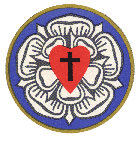PERIOD ENDING - Article
- December 31, 2007 - December 2007
---
- November 30, 2007 - November 2007
- October 31, 2007 - October 2007
- September 30, 2007 - September 2007
---
- August 31, 2007 - August 2007
- July 31, 2007 - July 2007
- June 30, 2007

The Anglican Communion commemorates many of the saints in the General Roman Calendar, often on the same days.
Like the Roman Catholic Church, the Anglican Communion has special holy days in honor of Jesus Christ, the Blessed Virgin Mary and the Apostles. Many of the parishes churches in the Communion have the names Christ Church, and St. Mary the Virgin.
The same can also be said for the four great patrons of the United Kingdom: Saint George (Patron of England), Saint David (Patron of Wales), Saint Patrick (Patron of Ireland), and Saint Andrew (Patron of Scotland). June 2007
- May 31, 2007
The Congregation for the Causes of Saints (Congregatio de Causis Sanctorum) is the congregation of the Roman Curia which oversees the complex process which leads to the canonization of saints, passing through the steps of a declaration of "heroic virtues" and beatification. After preparing a case, including the approval of miracles, the case is presented to the pope, who decides whether or not to proceed with beatification or canonization.
The predecessor of the congregation was the Sacred Congregation for Rites, founded by Pope Sixtus V on 22 January 1588 in the Bull Immensa Aeterni Dei. The congregation dealt both with regulating divine worship, and the causes of saints.
Prior to the congregation, the process of canonization was highly fragmented, with many saints being declared by localities, and with little evidence.
- April 30, 2007

Early Christians used the palm branch to symbolize the victory of the faithful over enemies of the soul, as in the Palm Sunday festival celebrating the triumphal entry of Jesus into Jerusalem. In Christian art, martyrs were usually shown holding palms representing the victory of spirit over flesh, and it was widely believed that a picture of a palm on a tomb meant that a martyr was buried there. April 2007 ---
- March 31, 2007

Joan of Arc has inspired artistic and cultural works for nearly six centuries. The following lists cover various media to include items of historic interest, enduring works of high art, and recent representations in popular culture. The entries represent portrayals that a reader has a reasonable chance of encountering rather than a complete catalog. Lesser known works, particularly from early periods, are not included. In 1979 the Bibliothèque Municipale in Rouen, France held an exhibition that contained over 500 images and other items that related to Joan of Arc.[1]
Many of the excluded items are derivative of better known representations. For instance, Schiller's play inspired at least 82 different dramatic works during the nineteenth century. Verdi's and Tchaikovski's operatic adaptations are still recorded and performed. Most of the others survive only in research libraries.[2] In 1894 Émile Huet listed over 400 plays and musical works about Joan of Arc. Despite a great deal of scholarly interest in Joan of Arc no complete list of artistic works about her exists, although a 1989 doctoral dissertation did identify all relevant films including ones for which no copy survives.
- February 28, 2007
The Lutheran Calendar of Saints is a listing which details the primary annual festivals and events that are celebrated liturgically by the Lutheran Church. The calendar of the Evangelical Lutheran Church in America (and largely the one given below) is from Evangelical Lutheran Worship published in 2006 as a replacement for the 1978 Lutheran Book of Worship. The elements of the calendar unique to the Lutheran Church - Missouri Synod are from the Lutheran Service Book.
The Lutheran calendar operates on two different cycles, that of Christmas and that of Easter. Within these two cycles all events to be commemorated fall. Because Easter varies in date each year based on the vernal equinox and the phases of the moon, it is called a moveable feast (see: date of Easter). Dates affected by placement of Easter include the Baptism of our Lord, Ash Wednesday and the start of Lent, the start of Easter itself, Pentecost, and Holy Trinity. Advent, the other moveable season on the calendar, comes exactly four Sundays before the start of Christmas (if Christmas falls on a Sunday, that day does not count), or the Sunday closest to St. Andrew’s Day (November 30). Like the other Western Church calendars, the first Sunday of Advent is also the first day of the liturgical year. The events commemorated on the Lutheran calendar fall into three different categories: Festivals, Lesser Festivals, and Commemorations.
- January 31, 2007
Father Damien, since 1995 Blessed Damien of Molokai, born Joseph de Veuster, SS.CC. (January 3, 1840, Tremelo – April 15, 1889, Molokai), was a Belgian Catholic missionary of the Congregation of the Sacred Hearts of Jesus and Mary who is revered primarily by Hawaii residents and Christians for having dedicated his life in service to the lepers of Molokai in the Kingdom of Hawaii. In Catholicism, Father Damien is the spiritual patron of people with leprosy, outcasts, and those with HIV/AIDS, and of the State of Hawaii. Father Damien Day is recognized each year in Hawaii on April 15. His Feast Day in the Catholic Church is May 10. Having been beatified in 1995, Father Damien is awaiting formal approval for sainthood.
The Father Damien Statue memorializes the priest in bronze at the United States Capitol. A full size replica stands in front of the Hawaii State Legislature. In 1995, Pope John Paul II beatified him and bestowed the official title of Blessed Damien of Molokai.
In 2005, Father Damien was chosen as the Greatest Belgian of all time by the Flemish public broadcasting service, VRT.

